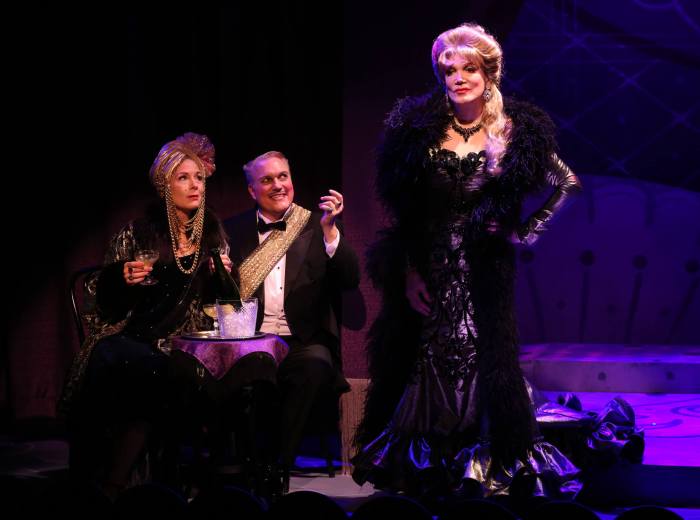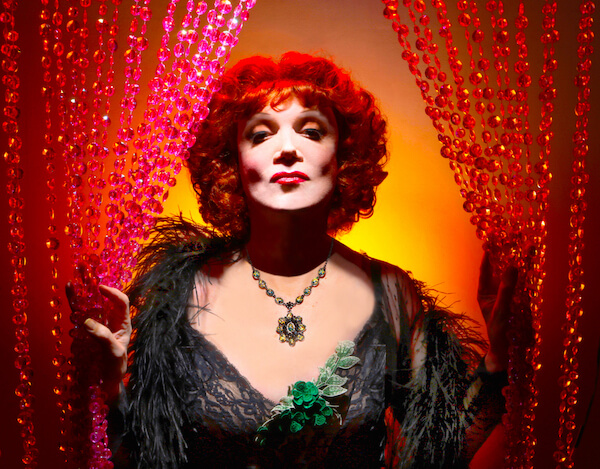BY DAVID KENNERLEY | Most everybody knows about the Red Scare in the early 1950s. But the Lavender Scare?
That’s when Senator Joseph McCarthy, who led the charge to root out those in government and elsewhere suspected of anti-American sympathies, expanded his sights beyond Communists to include homosexuals and other sexual non-conformists. These so-called perverts or degenerates, vulnerable to blackmail, were deemed security risks and booted from their jobs in the State Department. The campaign was nothing less than a ruthless, fear-mongering witch-hunt that ruined thousands of lives of innocent citizens. Believe it or not, considerably more gays and lesbians were scapegoated than Commies.
“Perfect Arrangement,” produced by Primary Stages, is one of the rare plays that dares shine a light on this shameful chapter in American history. But instead of crafting a wrenching drama, Topher Payne, the lauded, Atlanta-based playwright in his Off-Broadway debut, had something else in mind.
When McCarthy’s witch-hunt targeted more than just suspected Commies
He frames the story like a 1950s TV comedy, in the spirit of “Ozzie and Harriet” or “I Love Lucy.” The result is a fascinating if somewhat uneven piece of theater.
The wacky set-up is the stuff of vintage sitcoms, but with a trendy twist. Seemingly staid Bob (Robert Eli) and Millie (Mikaela Feely-Lehmann) Martindale live in an immaculate, tastefully appointed apartment (styled by Neil Patel) in Washington, DC’s Georgetown. Their next-door neighbors, Jim (the effervescent Christopher J. Hanke) and Norma (Julia Coffey) Baxter, have come over to help welcome Bob’s boss Theodore (Kevin O’Rourke) and his wife Kitty (Jennifer Van Dyck) over cocktails and canapés.
Pleasantries about the Matron’s League bazaar and Spry vegetable shortening (bits of dialogue seem lifted from period TV commercials) soon give way to more serious matters. Theodore, a bigwig at the State Department, announces the effort to expunge homos as well as Commies.
At first, the dutiful couples seem to support the cause to eradicate the “fags,” as Kitty calls them. Both Bob and Norma, who also works in the State personnel office, vow to continue keeping America pure. But as soon as Theodore and Kitty leave, the foursome show their true colors. And the predominant color is lavender.
Because their marriages are a sham. The women are secretly a couple and occupy that nifty apartment. The men are also a couple and share the one next door. In a deliciously clever visual metaphor, there’s a secret door between the abodes accessed through — where else? — the coat closet. We see them coming out and going back into this proverbial closet multiple times.
There’s plenty of same-sex smooching. Jim even jokes about sneaking into the girls’ pad to have “mansex” with Bob on their couch, much to Norma’s horror. “Grow up,” he says. “Sex is messy. Bodies leak things.”
The play is anchored by a solid dramatic through line — will they be discovered? Once Barbara, a fellow State employee targeted as a deviant, comes on the scene, their perfect arrangement starts to crumble. Soon a more urgent question emerges — who ends up with whom?
Bob is conflicted yet willing to follow orders. The notion that homosexuals can turn against their own kind, by the way, is not so farfetched. Look no further than closeted lawyer Roy Cohn, who notoriously partnered with the Feds to oust gays and lesbians during that period.
Director Michael Barakiva keeps the action moving apace, doing his best to reconcile the farcical and somber aspects of the script. While the entire cast is first-rate, Kelly McAndrew shines particularly bright as the lusty, “loose” Barbara who masterminds a way to fight a dirty, discriminatory system. When she calls Bob “a manipulative, self-loathing faggot,” it really stings.
Not that “Perfect Arrangement” is only concerned with chronicling Lavender Scare paranoia. It’s a sly commentary as well on the starched roles of male and females during this repressed, anxiety-ridden period. These cartoonish TV characters are made of flesh and blood and they’re tired of compromising. Norma wants to have a child of her own. The play even reveals the underpinnings of the modern gay rights movement. “They’ll never stop if we keep hiding,” says Millie.
Sure, there are some messages about artifice and tolerance and morality that verge on preachy, but that’s true to vintage sitcom form.
“It is a set, and these are the costumes,” says an exasperated Millie. “I would gladly give it up to have one photograph of Norma and me displayed anywhere in my home… It’s proof of who we are.”
PERFECT ARRANGEMENT | Primary Stages | The Duke on 42nd Street, 229 W. 42nd St. | Through Nov. 6: Tue.-Thu. at 7 p.m.; Fri.-Sat. at 8 p.m.; Sat. at 2 p.m.; Sun. at 3 p.m. | $70 at dukeon42.org | Two hrs., with intermission


































